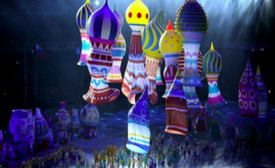soft power
In a thoughtful post on Ukraine and Vladimir Putin's decision to invade it, Ross Douthat suggests that the incursion was plausibly connected to White House fumbling in Syria. He begins with a nod to those who disagree. "Many writers I read and respect are dismissive of the idea that concepts like 'toughness' and 'credibility' and 'resolve' meaningfully shape the behavior of foreign actors," he writes.
Remember the Sochi Olympics? Yeah. Me, neither. There’s been so much focus on Ukraine, we almost forget that just a short time ago we were talking about the “twizzles” of ice dancing. Those were good times. The Sochi Olympics were widely considered a success. They helped introduce a new image of Russia to the world.
It was a good old-fashioned Olympic scandal in Sochi, when South Korean figure skater Kim Yuna, known as “the Queen,” lost to a less experienced Russian. The judgment spurred millions of angry Tweets, and a Change.org petition protesting the result was the fastest growing one on site record—reportedly more than 1.2 million signatures in about 12 hours.
The Sochi 2014 Winter Games drew Sunday night to a close, an Olympics intent on projecting the image of a strong and confident new Russia across this vast country and to the world beyond, with a mighty Russian team awakening the echoes of the mighty Soviet sport system to prideful spectator cheers of “Ro-ssi-ya! Ro-ssi-ya!”
As much of the world’s media continues to focus on the politics of the 2014 Sochi Winter Olympics and the continued violent protests in the Ukraine, another country closer to home threatens to descend into civil war. Street demonstrations throughout Venezuela, now entering their second week, have turned a country already suffering from high rates of violent crime and murders into a battleground.

As much of the world’s media continues to focus on the politics of the 2014 Sochi Winter Olympics and the continued violent protests in the Ukraine, another country closer to home threatens to descend into civil war.

China, the United Arab Emirates, Indonesia, and Russia are now known globally for their economic strength. But what about their cultures?







